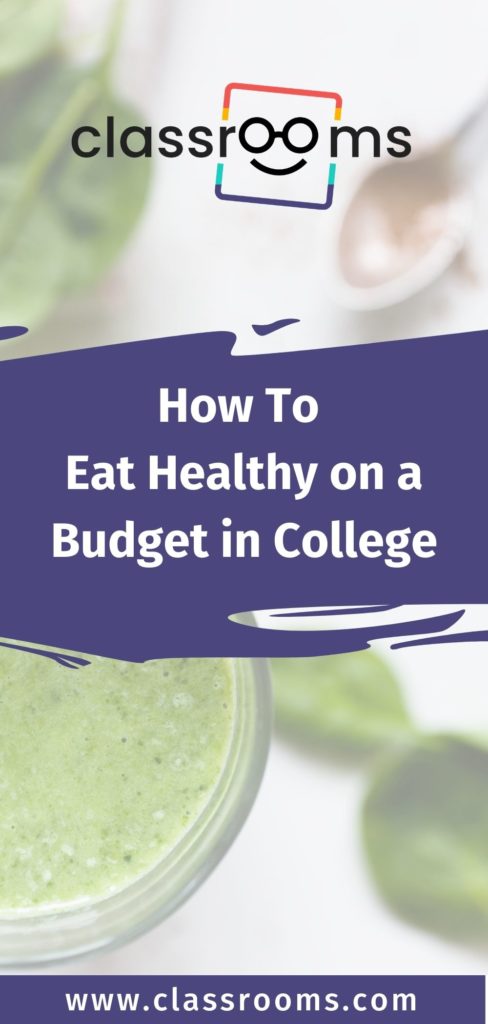
We are a reader-supported education publication. When you buy through links on our site, we may earn an affiliate commission to help us keep providing content.
Your college years might be the first time you have to learn how to budget. While you handle semesterly bills and rent, you also need to figure out how to eat healthy meals. If you reach for the cheapest food, you’ll likely leave the grocery store with boxes of junk food and instant meals. They’ll make you feel sick if you eat that kind of food all the time.
With these eight tips, you’ll learn how to eat healthy on a budget while you’re a college student. You don’t need to make a ton of money to afford nutritious food. Check out how you can refine your diet so you feel fueled and energized for whatever the semester has in store.
1. Analyze Your Nutrition
When you picture a well-rounded diet, what do you imagine? A healthy lifestyle always includes groups from the food pyramid, like whole grains, fruits, and vegetables. The pyramid explains how to get the nutrients your body needs to thrive. It even allows for a small allotment of the junk food you love to snack on.
Check out the food pyramid and compare it with your current diet. See what you’re currently eating and what you need to add or swap out. You’ll get a clear picture of what you should include in your grocery list and how each food improves your health.

2. Plan Your Meals
When you get home from a long day of classes, all you can think about is how hungry you feel. Your brain drives you to reach for the fastest solution, which is likely unhealthy options at campus convenience stores or fast-food restaurants.
You’ll give yourself a major helping hand by planning your meals. You’ll always know what’s coming up next and what you bought for snacks, so you won’t automatically eat bad food when you’re in a pinch. During your next study break, learn how to meal prep and use the food pyramid for inspiration so you know what to get during your next grocery run.
3. Drink Plenty of Water
You might forget to drink water when you’re stressed, busy, or have access to other beverages. Water is an essential part of maintaining your health. It regulates your digestion and gives you all-natural energy. It’s also great for studying. When you drink enough water, it improves your blood oxygen circulation, promoting brain function.
Experts recommend that people drink 11 cups per day at a minimum and more if you exercise. Make sure you sip your water throughout the day. Chugging it all at once will lead to uncomfortable bloating and potential stomach cramps.
4. Shop After Meals
Shopping when you’re not hungry is a big part of learning how to eat healthy on a budget. You’re more likely to buy whatever looks good and takes the least amount of time to prepare if your stomach is growling. Try scheduling your grocery trips ahead of time so you can eat before you leave. You’ll help yourself stick to your list and not overspend.

5. Limit Your Indulgences
You might create a meal plan that’s healthy and affordable. That’s great, but don’t tell yourself that you’ll never eat another sweet treat again. You might struggle with anxiety about avoiding bad foods and eventually overeat them, ruining your health and your budget.
Instead, give yourself some grace. Enjoy an indulgence every once in a while. When you finally make that delicious mug recipe in your dorm or snack on a candy bar, you can savor it without guilt or worry.
6. Freeze Your Meals
When you’re buying food on a tight budget, throwing out rotten food from the back of your fridge is the worst feeling. It’s like tossing money into the trash. Avoid wasting food when you use the batch cooking method to prep and freeze your meals.
Frozen food stays fresh for a long time. The low temperatures stop bacteria from growing or food from breaking down. When you buy that large bag of rice or container of ground beef, cooking and freezing it means you can eat it weeks or even months later. You’ll never waste food just because you didn’t get around to eating it.
7. Compare Store Prices
During your next free weekend afternoon, drive around to different grocery stores and farmer’s markets nearby. Take a journal and a pen or your favorite notes app and write down your upcoming grocery list. Next to each item, record the price at each store. You’ll find the best deals and know where to shop to maximize your budget.

8. Cook for Yourself
Ordering takeout is a nice way to treat yourself after passing an exam, but it drains your bank account when you place an order for every meal. Cooking for yourself saves on overpriced food and delivery fees. It also allows you to take a break from your studies, establishing a healthy school-life balance so your physical and mental health thrive.
If you’ve never cooked, experts are waiting to help you. Find a few inspiring recipes and watch chefs make them online, even if they’re some of the most basic meals. Following along with a video makes cooking more fun and less stressful.
Start With Something Small
Unless you love to dive into new things, figure out how to eat healthy on a budget by starting with something small. Cook one meal every day or figure out one freezer meal you enjoy. Once you practice these tips, eating a nutritious, affordable diet will feel effortless.










